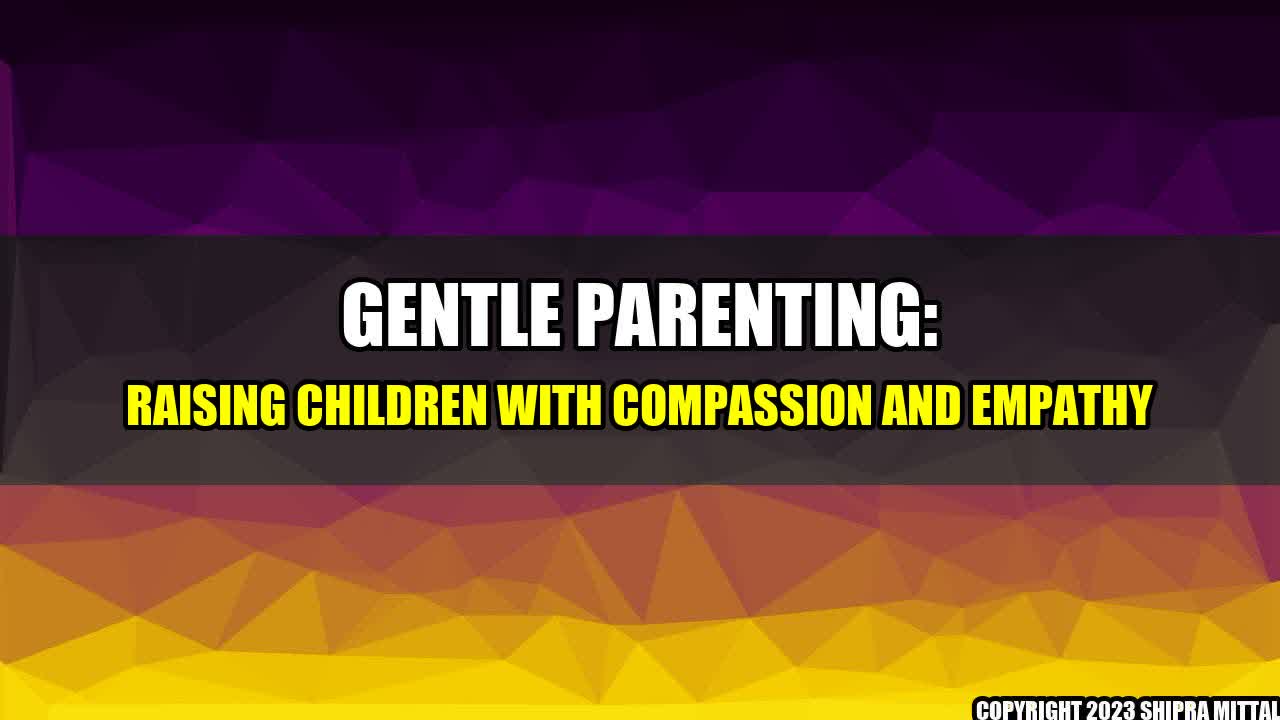An Interesting Story of Gentle Parenting
When Sarah became a mother, she knew that she wanted to raise her child with love, compassion, and empathy. But when she talked to other parents and read parenting books, she felt like she was supposed to use harsh discipline and control to "train" her child.
One day, she stumbled upon the concept of gentle parenting, and it resonated with her deeply. She learned that gentle parenting is about building a strong, respectful relationship with your child based on trust, communication, and emotional connection. It's about understanding your child's needs and emotions and responding to them with kindness and empathy.
Since then, Sarah has been practicing gentle parenting with her child, and she has seen amazing results. Her child is confident, empathetic, and self-aware, and their relationship is filled with love and respect.
What is Gentle Parenting?
Gentle parenting is an approach to raising children that emphasizes love, respect, and empathy. It is based on the idea that children are full, complex human beings who deserve to be treated with dignity and compassion, not as objects to be controlled.
Gentle parenting is about creating a positive, supportive environment for your child to thrive in. It is about recognizing and responding to your child's needs, emotions, and behaviors in a way that empowers them, rather than diminishes them. It is about building strong, loving relationships with your child that are based on trust and communication.
Gentle parenting is not permissive parenting, nor is it about being a "pushover." It is about setting clear boundaries and expectations, while also being flexible and responsive to your child's needs.
The Stats on Gentle Parenting
The gentle parenting movement is gaining traction with families around the world. Here are some statistics that highlight this trend:
- According to a survey by the Positive Parenting Alliance, 62% of parents said that they had heard of gentle parenting, and 41% said that they were actively practicing it.
- A study published in the journal Early Childhood Research Quarterly found that children who were raised with gentle parenting were more likely to have better mental health outcomes, including less anxiety and depression, than children who were raised with authoritarian parenting.
- Research conducted by the Gottman Institute has shown that gentle parenting techniques, such as using "emotion coaching" to help your child regulate their emotions, can increase your child's emotional intelligence and improve their social skills.
- According to a survey conducted by the BabyCenter, 89% of mothers said that they believe in gentle parenting, and 70% said that they practice it.
Practical Tips for Gentle Parenting
If you're interested in practicing gentle parenting with your child, here are some practical tips to get you started:
- Practice active listening: Take the time to really listen to your child when they're trying to communicate with you. This means giving them your full attention, asking questions, and empathizing with their feelings.
- Use positive reinforcement: Instead of punishing your child for misbehavior, try to focus on rewarding good behavior with praise, compliments, and other positive reinforcement.
- Avoid shaming and blaming: Instead of making your child feel bad for their mistakes, try to focus on solutions and problem-solving. Help your child learn from their mistakes and move forward in a positive way.
- Set clear boundaries and expectations: Children need structure and consistency to feel safe and secure. Make sure that your child knows what is expected of them and what the consequences of breaking rules are.
- Practice self-care: Being a gentle parent is hard work, and it's important to take care of yourself so that you can be the best parent possible. Make sure to take breaks when you need them, get enough sleep and exercise, and find ways to manage your own stress and emotions.
Real Stories of Gentle Parenting
Here are some real stories of parents practicing gentle parenting:
Samantha's Story:
When Samantha's daughter started throwing tantrums in public, she used to feel embarrassed and overwhelmed. But after learning about gentle parenting, she started responding to her daughter's emotions with empathy and understanding. She would get down on her daughter's level and talk to her calmly, helping her to regulate her emotions and come up with a solution together. Now, her daughter hardly ever has tantrums, and their relationship is stronger than ever.
Mark's Story:
Mark used to believe that the only way to get his son to listen and behave was to yell and threaten him. But after realizing that this approach wasn't working, he started learning about gentle parenting. He started setting clear boundaries and expectations for his son, but in a way that was respectful and empathetic. He learned how to use positive reinforcement and rewards, rather than punishments, to encourage good behavior. Now, his son is more cooperative and respectful, and their relationship is much more loving and supportive.
Jessica's Story:
Jessica used to feel like she had to be the "perfect" parent, always managing her son's every move and controlling his behavior. But after discovering gentle parenting, she started focusing on building a strong, trusting relationship with her son. She learned how to communicate with him in a way that was respectful and empathetic, and started giving him more independence to make his own choices. Now, her son is thriving and confident, and their bond is unbreakable.

Akash Mittal Tech Article
Share on Twitter Share on LinkedIn